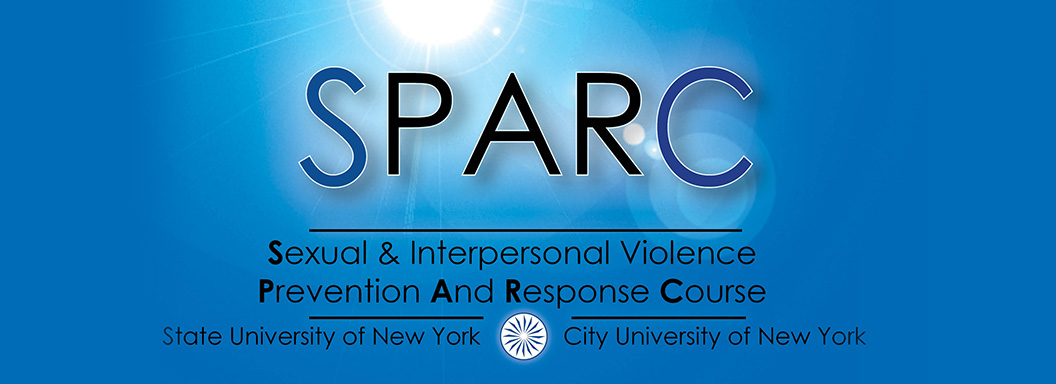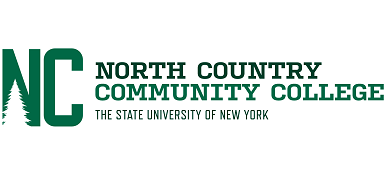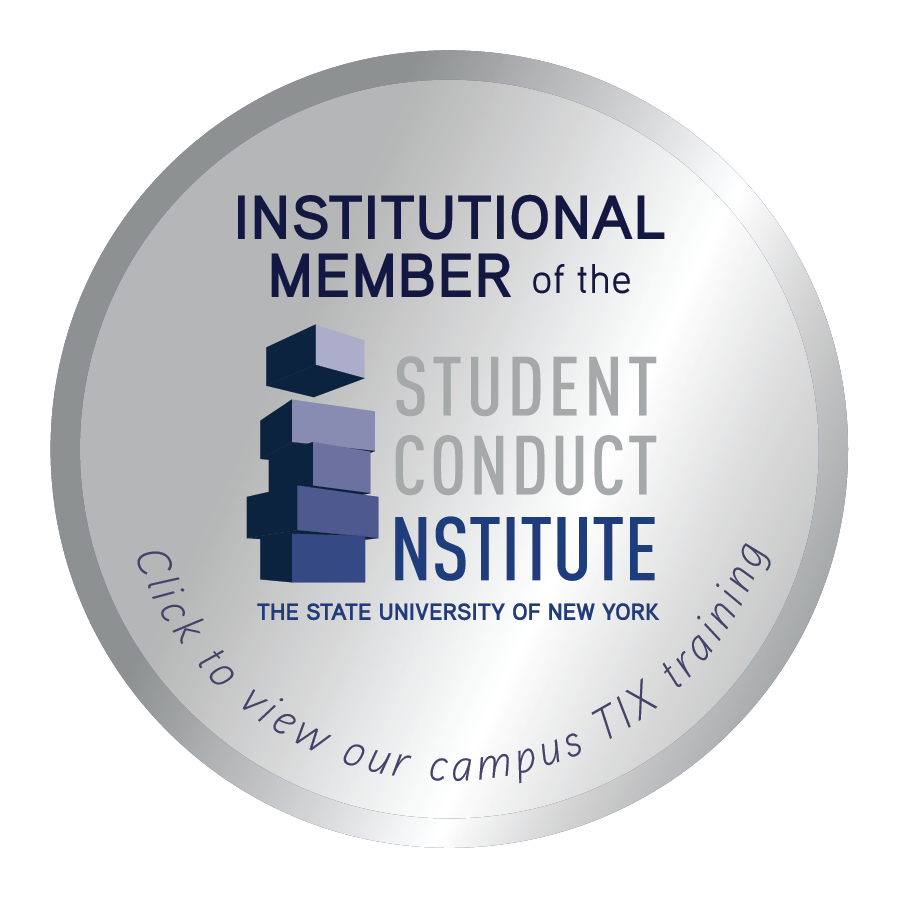Title IX Resources & Protections
Title IX of the Education Amendments of 1972 prohibits discrimination based on sex in education programs or activities, including academic, educational, extracurricular, athletic, and other programs or activities at the College.
North Country Community College is committed to maintaining a safe and inclusive environment for all students and employees.
Our commitment to effectively respond to experiences of sexual harassment and gender-based violence requires that College faculty and staff report disclosures of gender-based misconduct and/or sexual misconduct involving a member of the campus community to the Title IX Coordinator. Disclosures of pregnancy, new parenting status or lactation status are also reported to the Title IX Coordinator in order to provide reasonable accommodations. When reporting, faculty and staff must provide relevant details to assist with the College with response; this information will remain private and requests for confidentiality will be respected but cannot be guaranteed. The Title IX Coordinator will follow up with the reporting student or employee directly to offer options for disclosure and formal complaint grievance procedures.
For assistance with Title IX, please contact:
Dr. Jackie VanBrunt
AVP Student Affairs / Title IX Coordinator / Chief Diversity Officer
Hodson Hall 125
23 Santanoni Ave
Saranac Lake, NY 12983
jackie.vanbrunt@nccc.edu
TITLE IX - Frequently Asked Questions
It's a federal law which states, " No person in the United States shall, on the basis of sex, be excluded from participation in, be denied the benefits of, or be subjected to discrimination under any education program or activity receiving federal financial assistance." - Title IX of the Education Amendments of 1972, Implementing Regulations at: 20 U.S.C § 1681 & 34 C.F.R. Part 106
On May 19, 2020, the U.S. Department of Education published long-anticipated official final regulations governing institutional responses to Title IX “sexual harassment,” including sexual violence. 85 Fed. Reg. 30026 (May 19, 2020) (“Final Rule”). Along with defining the scope of an institution’s Title IX jurisdiction, these comprehensive regulations indicate the supportive measures that institutions must offer to individuals who report sexual harassment, and the grievance process institutions must provide to complainants and respondents before issuing any disciplinary sanction arising from a formal complaint. These regulations are effective as of August 14, 2020.
Title IX legislation also protects pregnancy and parenting students by providing reasonable accommodations. The College is committed to creating an accessible and inclusive environment for pregnant and parenting students. Pregnant and parenting students at the College will not be excluded from any class, activity, or program on the basis of sex, pregnancy, childbirth, false pregnancy, termination of pregnancy or recovery therefrom. Pregnant and parenting students may request reasonable accommodations when necessary because of pregnancy or parenting status, which, depend on the student’s individual needs and circumstances.
Recommended resources related to Title IX Protections for pregnant or new parenting status:
- Jackie VanBrunt, Interim AVP Student Affairs. 518-891-2915, ext. 1205
- Tara Evans, Human Resources Director, 518-891-2915, ext. 1209
- Chad LaDue, Athletics Director, 518-891-2915, ext. 1323
- Angela Brice, Assistant Director of Student Life, 518-891-2915, ext. 1266
- Director of Residence Life & Housing, 518-891-2915, ext. 4400
North Country Community College is a member of the SUNY Student Conduct Institute.
Section 106.45(b) of the 2020 Final Title IX Rules require the sharing of “All materials used to train Title IX Coordinators, investigators, decision-makers, and any person who facilitates an informal resolution process. A recipient must make these training materials publicly available on its website, or if the recipient does not maintain a website the recipient must make these materials available upon request for inspection by members of the public.”
Faculty and staff are encouraged to invite the Title IX Coordinator/College Diversity Officer or member of the Student Life Office to their classroom to present on topics related to Title IX, campus safety, health relationships, bystander intervention, and consent.
To request a workshop presentation, please complete this form and a member of the Student Affairs division will be in touch to confirm your request: https://forms.office.com/r/R6NRXTGGYK
All student leaders and student athletes are required to complete the SUNY SPARC training
annually. All students are invited to complete this training on sexual and interpersonal
violence prevention and response as part of their new student orientation. Click below
to to access this free training.
North Country Community College Student Affairs staff are also trained to utilize and deliver prevention curriculum offered by the One Love Foundation.
The first step to the Title IX process is to speak with the Title IX Coordinator at North Country Community College who will listen and ask questions to determine if the report fits the Title IX regulation requirements for jurisdiction or if referral to the College's student conduct process is more appropriate. Supportive measures and appeal options are also explained during the process. A formal written complaint submitted directly to the Title IX Coordinator is required to begin the TItle IX investigation process.
Title IX legislation also provides reasonable accommodations for pregnant and parenting students enrolled at the College if they have disclosed their status. If you believe you have not received reasonable accommodations, please contact the Title IX Coordinator.
Contact Title IX Coordinator Jackie VanBrunt -- jackie.vanbrunt@nccc.edu to begin.
College policies/procedures for responding to reports of sexual violence & sexual harassment:
NCCC students and employees have the right to make a report to the Title IX Coordinator or Human Resources Director as well as local law enforcement and/or the State Police. NCCC students and employees also have the right to choose not to report; to be protected by the College from retaliation for reporting ; and to receive supportive measures and resources from the College.
Affirmative consent is a knowing, voluntary, and mutual decision among all participants to engage in sexual activity. Consent can be given by words or actions, as long as those words or actions create clear permission regarding willingness to engage in the sexual activity. Silence or lack of resistance, in and of itself, does not demonstrate consent. The definition of consent does not vary based upon a participant's sex, sexual orientation, gender identity, or gender expression.
AS DESCRIBED IN OUR STUDENT CODE OF CONDUCT:
- Consent to any sexual act or prior consensual sexual activity between or with any party does not necessarily constitute consent to any other sexual act.
- Consent is required regardless of whether the person initiating the act is under the influence of drugs and/or alcohol.
- Consent may be initially given but withdrawn at any time.
- Consent cannot be given when a person is incapacitated, which occurs when an individual lacks the ability to knowingly choose to participate in sexual activity. Incapacitation may be caused by the lack of consciousness or being asleep, being involuntarily restrained, or if an individual otherwise cannot consent. Depending on the degree of intoxication, someone who is under the influence of alcohol, drugs, or other intoxicants may be incapacitated and, therefore, unable to consent.
- Consent cannot be given when it is the result of any coercion, intimidation, force, or threat of harm.
- When consent is withdrawn or can no longer be given, sexual activity must stop.
The State University of New York and North Country Community College are committed to providing options, support and assistance to victims/survivors of sexual assault, domestic violence, dating violence, and/or stalking to ensure that they can continue to participate in college-wide campus programs, activities, and employment. All victims/survivors of these crimes and violations, regardless of race, color, national origin, religion, creed, age, disability, sex, gender identity or expression, sexual orientation, familial status, pregnancy, predisposing genetic characteristics, military status, domestic violence victim status, or criminal conviction, have the following rights, regardless of whether the crime or violation occurs on campus, off campus, or while studying abroad.
All students have the right to:
- Make a report to local law enforcement and/or state police;
- Have disclosures of domestic violence, dating violence, stalking, and sexual assault treated seriously;
- Make a decision about whether or not to disclose a crime or violation and participate in the judicial or conduct process and/or criminal justice process free from pressure by the institution;
- Participate in a process that is fair, impartial, and provides adequate notice and a meaningful opportunity to be heard;
- Be treated with dignity and to receive from the institution courteous, fair, and respectful health care and counseling services, where available;
- Be free from any suggestion that the reporting individual is at fault when these crimes and violations are committed, or should have acted in a different manner to avoid such crimes or violations;
- Describe the incident to as few institution representatives as practicable and not be required to unnecessarily repeat a description of the incident;
- Be protected from retaliation by the institution, any student, the accused and/or the respondent, and/or their friends, family and acquaintances within the jurisdiction of the institution;
- Access to at least one level of appeal of a determination;
- Be accompanied by an advisor of choice who may assist and advise a reporting individual, accused, or respondent throughout the judicial or conduct process including during all meetings and hearings related to such process; and
- Exercise civil rights and practice of religion without interference by the investigative, criminal justice, or judicial or conduct process of the institution.
The health and safety of every student at North Country Community College (NCCC) is of utmost importance. NCCC recognizes that students who have been drinking and/or using drugs (whether such use is voluntary or involuntary) at the time that violence, including but not limited to domestic violence, dating violence, stalking, or sexual assault, occurs may be hesitant to report such incidents due to fear of potential consequences for their own conduct.
NCCC strongly encourages students to report domestic violence, dating violence, stalking, or sexual assault to institution officials. A bystander acting in good faith or a reporting individual acting in good faith that discloses any incident of domestic violence, dating violence, stalking, or sexual assault to NCCC officials or law enforcement will not be subject to NCCC's code of conduct action for violations of alcohol and/or drug use policies occurring at or near the time of the commission of the domestic violence, dating violence, stalking, or sexual assault.
North Country Community College wants you to get the information and support you need regardless of whether you would like to move forward with a report of sexual violence to campus officials and/or to police. You may want to talk with someone about something you observed or experienced, even if you are not sure that the behavior constitutes sexual violence. A conversation where questions can be answered is far superior to keeping something to yourself. Confidentiality varies, and our Options for Disclosure webpage is aimed at helping you understand how confidentiality applies to different resources that may be available to you.
Consistent with NYS Education Law Article 129 B and policies of The State University of New York, North Country Community College participated in the most recent 2023 System-wide Biennial SUNY Sexual violence Prevalence (SVP) Campus Climate Survey. The SVP survey gathered information about student and employee experience with sexual and interpersonal violence and knowledge of policies and resources.
In spring 2023, unfortunately only 7 students and 13 employees responded compared to 275 students and 48 employees who completed the survey in 2021 (response rate for students in 2023 was only 1/2% compared to 42% of students in 2021 and only 7.9% of employees in 2023 compared to 32.7% in 2021).
In the 2023 survey responses, zero students reported they were subject to sexual harassment in the prior year and zero students reported that they were subject to sexual assault in the prior year. Eighty percent (80%) of students and 100% of employees indicated familiarity with affirmative consent, all but one student responder and all employee responders indicated they knew where to report sexual misconduct including sexual assault, sexual harassment, domestic violence/dating violence, and stalking, and lastly about forty-three percent (43%) of students and all employees could identify how to contact the Title IX Coordinator.
In the 2021 survey, zero students reported that they were subject to sexual harassment in the prior year and zero students reported that they were subject to sexual assault in the prior year. About forty-three (43%) of students indicated familiarity with affirmative consent, fifty percent (50%) indicated that they knew where to report sexual misconduct, and about thirty five percent (34.8%) could identify how to contact the Title IX Coordinator.
North Country Community College, working with SUNY and community colleagues (including students, faculty, and staff), will use these data to improve response to violence, develop prevention programs, and will continue to study the issue. The next SVP Campus Climate Survey will be administered in Spring 2025. More information about the survey is available at https://www.suny.edu/climatesurvey/.
If you have any questions about the survey, please contact the Title IX Coordinator Jackie VanBrunt -- jackie.vanbrunt@nccc.edu.
Additionally, below please find a snapshot of the cases managed by the Title IX Coordinator during the 2022-2023 academic year at North Country Community College.
Title IX, VAWA, and NYS Education Law 129 B Statistical Report for 2022-2023 Academic Year
|
STUDENT BEHAVIOR REPORTED TO |
FALL 2022 |
SPRING 2023 |
|
Reported Dating Violence |
1 |
1 |
|
Reported Domestic Violence |
1 |
1 |
|
Reported Stalking |
0 |
1 |
|
Reported Sexual Assault |
0 |
0 |
|
Reported Non-Consensual Sexual Intercourse |
0 |
0 |
|
Reported Non-Consensual Sexual Contact |
0 |
0 |
|
Reported Sexual Exploitation |
0 |
0 |
|
Reported Sexual Harassment |
0 |
2 |
|
Gender Discrimination |
0 |
0 |
|
Pregnancy Disclosure |
6 |
4 |
|
Newborn Parenting Status Disclosure |
2 |
9 |
The College's policy is that response to sexual violence and related crimes are driven by the reporting victim/survivor. In alignment with Federal and New York State law, the College encourages you to use all of the response, support and reporting resources offered and leaves the choice of what resources to use and when up to the victim and survivor.
See Student Code of Conduct on our Campus Safety webpage for full descriptions of College sexual misconduct policies and procedures.
“Gender based misconduct” includes sexual assault, stalking, sexual harassment, dating violence, intimate partner violence, domestic violence, sexual exploitation, and gender based harassment. All students have a right to their body and their safety. North Country Community college takes reports of sexual assault, domestic violence, dating violence and stalking seriously. If you are a student of NCCC and have experienced any of these, please use the information provided here to seek resources and support, and to report the crime to law enforcement and campus officials.


